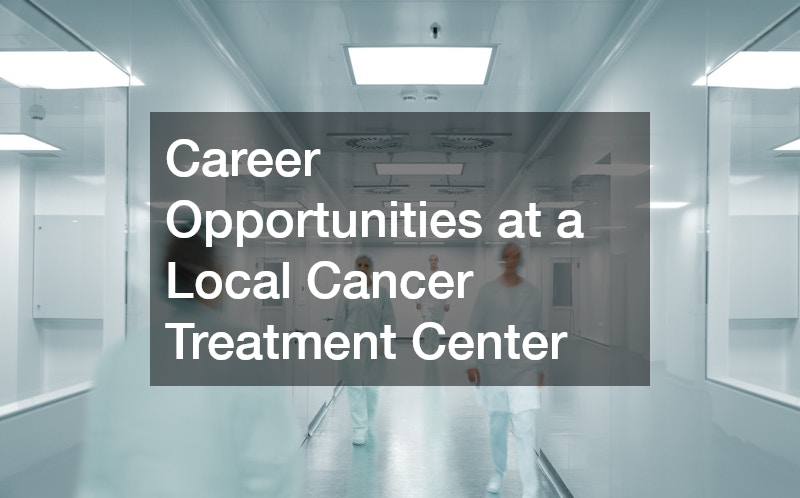Discovering the diverse career paths available at a local cancer treatment center and understanding the impact of these roles in the fight against cancer.
What Types of Career Opportunities Are Available?
Clinical Positions
Clinical roles such as oncologists, nurses, and laboratory technicians are essential in advancing patient care and treatment. These professionals work closely with patients and technology to diagnose and manage cancer.
Oncologists play a pivotal role by devising and supervising treatment plans tailored to individual patients. Nurses provide ongoing care, education, and emotional support to patients and their families.
Laboratory technicians perform routine and complex tests that assist in the diagnosis and monitoring of cancer. Their precise work is critical to the success of the broader medical team.
Non-Clinical Positions
A variety of non-clinical roles in administration, research, and operations help support the cancer treatment center’s mission. Administrative professionals ensure that the operations run smoothly and efficiently.
Research roles focus on developing cutting-edge treatments and understanding cancer biology. Operations staff ensure that the facility is well-maintained and that logistics are managed seamlessly.
Each of these roles contributes significantly to patient care, directly or indirectly, by ensuring the center operates optimally. All employees work towards a common goal — advancing cancer care.
What Qualifications and Skills Are Required?
Educational Requirements
Different positions require varying degrees and certifications, ranging from bachelor’s to doctoral levels. Oncologists, for instance, need extensive medical training, whereas laboratory technicians may start with an associate degree.
Nurses often require a bachelor’s degree in nursing along with state licensing. Roles in research may necessitate advanced degrees in biochemistry or related fields.
Administrative and operational positions might call for business or healthcare administration degrees. Regardless of the position, formal education is a key stepping stone.
Essential Skills and Qualities
Attention to detail and strong communication skills are vital for success at a cancer treatment center. Empathy and emotional resilience are crucial attributes, particularly for those directly interacting with patients.
Technical proficiency and the ability to work collaboratively enhance the effectiveness of both clinical and non-clinical employees. Problem-solving skills are indispensable in adapting to the ever-changing landscape of cancer treatment.
Flexibility and a patient-first approach are revered across the board, fostering an environment where every employee contributes to comprehensive patient care. These qualities drive the overall success of the center.
How to Apply for a Position?
Application Process
Candidates must submit a detailed resume and cover letter tailored to the position they are seeking. The online application portal is the first step toward joining a vital team dedicated to battling cancer.
Following a successful application, candidates may be invited for a series of interviews and assessments. These interactions give insight into whether the candidate aligns with the center’s mission.
The process is designed to identify skilled professionals who can contribute effectively. It’s important to showcase both expertise and a sincere commitment to patient care.
Interview Tips
Preparation is key: research the center and understand its mission and values before the interview. Be ready to discuss specific examples of past experiences and how they’ve prepared you for a role at the cancer center.
Practicing common interview questions can help build confidence. Maintain professionalism throughout, while also displaying empathy and a genuine interest in cancer treatment and patient care.
Seek feedback after interviews to understand areas of strength and improvement. Remember, interviews are opportunities to demonstrate how your skills can align with the center’s objectives and values.
What Are the Benefits of Working Here?
Professional Growth and Development
Working at a cancer treatment center offers numerous professional development opportunities. Employees can access continuing education programs designed to expand their expertise in oncology.
The center encourages career advancement through mentorship and formal progression paths. Professionals are often supported in pursuing certifications and higher degrees.
This commitment to development fosters personal and career growth, ensuring employees can thrive and contribute meaningfully. A focus on lifelong learning benefits both staff and patients.
Compensation and Benefits
The cancer treatment center provides competitive salaries within the healthcare industry. A comprehensive package includes health insurance, retirement plans, and paid time off.
Such benefits reflect the center’s dedication to employee satisfaction and well-being. Additional perks, like wellness programs and professional development grants, further enhance job satisfaction.
Recognizing the hard work and dedication of employees, the center ensures that compensation fairly reflects the challenging yet rewarding nature of the work. The center aims to attract and retain top talent through these offerings.
What Is the Work Culture Like?
Team Collaboration
A strong team-oriented culture is at the heart of the cancer treatment center. Open communication and mutual respect ensure that everyone works together effectively.
Regular interdepartmental meetings promote sharing of best practices and innovative ideas. Collaboration extends beyond professional duties, fostering a sense of community.
Through teamwork, employees support each other in achieving the common goal of improved patient outcomes. Working as a cohesive unit enhances both morale and productivity.
Patient-Centered Approach
The center is committed to a patient-first ethos, ensuring that every decision prioritizes patient welfare. This approach involves seeking patient feedback and tailoring services accordingly.
Staff are encouraged to engage with patients and families, building trust and understanding. This dedication to patient care distinguishes the center’s service delivery.
Every team member plays an integral role in maintaining this culture, making the work deeply rewarding. Accountability towards patient care is a shared responsibility at the center.
.


